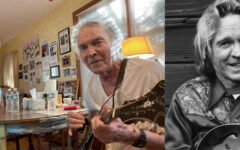
The Infamous Stringdusters at Red Rocks – photo by J.Mimna Photography
It’s a Tuesday night in Knoxville Tennessee and although it could be considered an off night, an audience is being energized by a performance from the Infamous Stringdusters who are onstage at the city’s iconic Bijou Theatre. It’s a modest sized crowd, but the enthusiasm more than makes up for the fact that the house still contains some empty seats. Ageing Deadheads clad in tie-die, young hipsters in baseball caps clutching their brews, and various types in-between are all up on their feet, swaying to a combination of extended jams and amiable melodies. The energy is irrepressible, and each song in the Stringdusters’ set finds the musicians propelled forward at full tilt. The frenetic solos and shared vocals demonstrate the fact that while each musician is clearly capable in his own right, together they’re a remarkably well oiled machine easily able to shift gears and groove in whatever motif the vibe calls for.
“The band that we kind of looked to was Béla Fleck and the Flecktones because they could play any kind of venue, whether it was one-off or for a festival crowd, whether it was a jazz festival or bluegrass festival, and people would latch onto it and love it for what it was,” bassist Travis Book noted a few days before the show. “Even if it was a concert hall, people would be up dancing. Even if it was a folk festival, people would feel free to get up and dance and do their thing. I don’t want to be presumptuous and think of ourselves in the same category as the Flecktones, one of the greatest bands that ever existed, but they were sort of a template for what was possible, along with bands like String Cheese Incident and Yonder Mountain, which are the closest to what we were doing as a true string band. That has been our trajectory for maybe the last eight years. That was true to our own influences and the things we were listening to. We wanted to improvise and we didn’t want to alienate our bluegrass fans, but we also knew they were going to have to rise to the occasion because the music was going to be loud, the lights were going to be bright and we were going to be jamming.”
That was evident at Tuesday night’s show, and the band’s choice of material — from covers of such vintage standbys as If I Had a Hammer (which rang especially true in light of today’s treacherous times) and the familiar Grateful Dead standby, He’s Gone, to their ready stash of original material — was greeted by the roaring collective approval of all who were on hand.
“Any term you come up with is going to be carrying its own baggage,” Book insists. “The thing that’s most true about our band is that we’re a string band. We’re playing stringed instruments.
So you can call it Americana music because it is an amalgamation of all these genuinely American styles of music. That is to stay, bluegrass, blues, rock and roll, jazz, country and even Grateful Dead music, which is a genre unto itself. That’s been a huge influence on us. We’re drawing from just about every American music art form that we’re into. The only real bluegrass was Bill Monroe’s bluegrass. Everything else that came after that was a copy of that — and the copy is never as good as the real thing — or some derivative that’s pulling from other places. In my opinion, there’s only been one real bluegrass band and there’s been a lot of string bands. The term string band has its own thing and its own pretensions.”
Nevertheless, over the course of the past dozen years, the band — Book (double bass), Andy Hall (dobro), Jeremy Garrett (fiddle), Andy Falco (guitar) and Chris Pandolfi (banjo) — have procured all manner of populist possibilities, veering from bluegrass through grassicana to a more progressive posture which finds them soaring far from established parameters and into realms of free flight instrumental ingenuity.
“Talking about music is like dancing to architecture,” Book suggests. “The genre-cation of music is useful if you’re trying to turn people on through marketing. It’s a necessary exercise, but it’s almost futile, because any band that’s worth their salt should be doing something that’s distinctive to themselves. And all music is derivative. In terms of string band music, you can trace all this stuff back. Even the music that we’re doing that sounds original is all essentially derivative. However, there’s a little bit of organic originality. Those are the things that we hang our hat on. It is a challenge for sure. Part of that is that we’re not reproducing the songs we’ve recorded when we’re playing on stage. Those songs are being born anew every time we play them. At first, when we were capturing the earlier records, we tried to be as polished and shiny as possible, but with the last few records, we went in well prepared, understanding exactly how the songs go and allowing ourselves to create them uniquely in the moment and to add a little character.”
While other outfits might opt for that polished approach, Book suggests that spontaneity is now the Stringdusters’ number one priority.
“One of the criticisms of our recordings over the years — and not unjustified — is that they tended to be a little shiny,” he suggests. “That had a lot to do with us coming up in the Nashville scene and being involved in sessions, and being involved with artists and kind of going for that and getting indoctrinated in that. It doesn’t help that we’re all pretty competent on our instruments and we all have a pretty good idea of how we want them to sound. We can make a record that definitely sounds pretty polished. But with the last few albums, we’ve been recording things live, recording things as they are and spending less times going back and patching things up.”
Although the band has earned its share of accolades from the bluegrass world — three awards from the IBMA including Emerging Artist of the Year, Album of the Year and Song of the Year, and a nomination as Entertainer of the Year, as well as a Grammy for Best Bluegrass Album — they’ve taken pains to avoid typecasting.
“When we all started the band, we were coming from different places,” Book explains. “I was coming from the Colorado scene where there were a lot of singer/songwriters and I was in a bluegrass band of my own. Almost 13 years ago, we had a member of Greensky Bluegrass in our band and we had a member of Leftover Salmon in the band and we had a great guitar player named John Stickley who was also in the band, and he has his own trio now. Our banjo player had just come out of the Berkley School of Music. Our dobro player had played with Dolly Parton and Jeremy, our fiddle player was with Bobby Osborne and Ronnie Bowman. Our guitar player was initially Chris Eldridge, and then he left for the Punch Brothers.”
As a result, it became clear from the beginning that one single style wasn’t enough to define the Stringdusters’ MO.
“It occurred to us very quickly that here we were, having won album of the year and song of the year, and best emerging artist, and not very far from the top of the bluegrass heap,” Book recalls. “That wasn’t going to be enough for us. Not just in terms of a career, but also in musical terms as well. There was a space that could be covered as a string band, and there were a lot of examples over the years of bands that went in that direction, typically bands like New Grass Revival, like Leftover Salmon, the String Cheese Incident, Yonder Mountain String Band… and while we didn’t want to emulate any of those bands, it was also clear that there was great potential if you cultivate your own thing and develop your own fan base and not be beholding just to the bluegrass crowd.”
In practical terms, Book said that meant reversing course and returning to more intimate settings like clubs and concerts where the audiences might be smaller but also more appreciative and understanding as well.
“We had to take a few steps back and start playing in rock clubs and selling hard tickets instead of taking easy money playing bluegrass series and bluegrass concerts,” Book maintains. “That was really challenging but it was a decision we made early on, because we didn’t want to run up against that attitude of ‘Well, this isn’t what I was expecting, or this isn’t real bluegrass.’ So very early in our career, we made the decision that we were essentially going to forge our own way.
So we find ourselves now in a situation where we can play a festival where it’s early traditional bluegrass, and we can fit right in. We can play the Newport Folk Festival and it works. We can play any old sort of random street festival and we can capture people’s attention. So what that has afforded us is a great deal of freedom to play music that we really love and that feeds all of our musical needs. Nobody has to look elsewhere.”
Nowadays the band plays approximately 110 to 120 dates a year apart from the time they spend in the recording studio. Book mentions that they are wrapping up a new album which is being readied for release in January.
“When people ask us, we say, somewhat jokingly, that we’re from the United States of America,” he notes. “We spend so much time moving around the country. We’ve played everywhere in the country and we come from different places and we live in different places so its very hard to pin down. The festival scene is really our scene. We go all the way from San Diego up to Bellingham Washington and all the way down to Tampa Florida and everywhere in between. So we’re really children of the USA as much as anywhere at this point. We’re still into the music, but not so far from our families that they don’t recognize us when we come home.”







